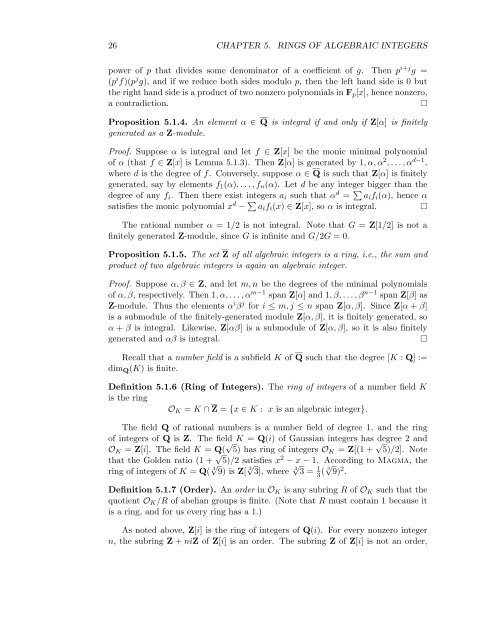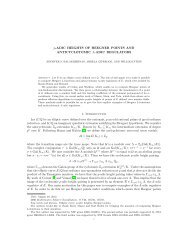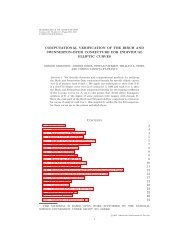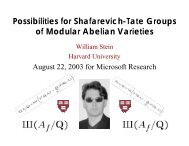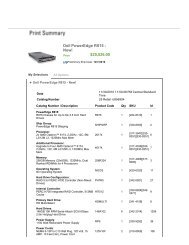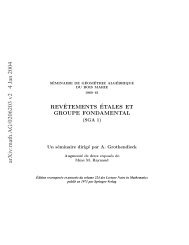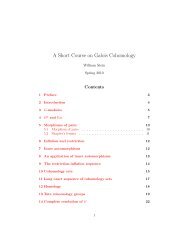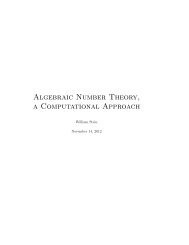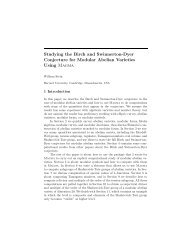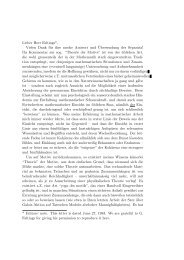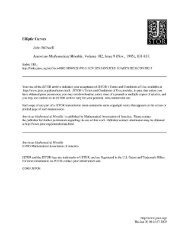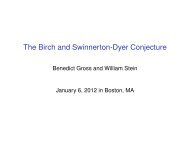A Brief Introduction to Classical and Adelic Algebraic ... - William Stein
A Brief Introduction to Classical and Adelic Algebraic ... - William Stein
A Brief Introduction to Classical and Adelic Algebraic ... - William Stein
You also want an ePaper? Increase the reach of your titles
YUMPU automatically turns print PDFs into web optimized ePapers that Google loves.
26 CHAPTER 5. RINGS OF ALGEBRAIC INTEGERS<br />
power of p that divides some denomina<strong>to</strong>r of a coefficient of g. Then p i+j g =<br />
(p i f)(p j g), <strong>and</strong> if we reduce both sides modulo p, then the left h<strong>and</strong> side is 0 but<br />
the right h<strong>and</strong> side is a product of two nonzero polynomials in Fp[x], hence nonzero,<br />
a contradiction.<br />
Proposition 5.1.4. An element α ∈ Q is integral if <strong>and</strong> only if Z[α] is finitely<br />
generated as a Z-module.<br />
Proof. Suppose α is integral <strong>and</strong> let f ∈ Z[x] be the monic minimal polynomial<br />
of α (that f ∈ Z[x] is Lemma 5.1.3). Then Z[α] is generated by 1, α, α 2 , . . .,α d−1 ,<br />
where d is the degree of f. Conversely, suppose α ∈ Q is such that Z[α] is finitely<br />
generated, say by elements f1(α), . . . , fn(α). Let d be any integer bigger than the<br />
degree of any fi. Then there exist integers ai such that α d = aifi(α), hence α<br />
satisfies the monic polynomial x d − aifi(x) ∈ Z[x], so α is integral.<br />
The rational number α = 1/2 is not integral. Note that G = Z[1/2] is not a<br />
finitely generated Z-module, since G is infinite <strong>and</strong> G/2G = 0.<br />
Proposition 5.1.5. The set Z of all algebraic integers is a ring, i.e., the sum <strong>and</strong><br />
product of two algebraic integers is again an algebraic integer.<br />
Proof. Suppose α, β ∈ Z, <strong>and</strong> let m, n be the degrees of the minimal polynomials<br />
of α, β, respectively. Then 1, α, . . . , α m−1 span Z[α] <strong>and</strong> 1, β, . . .,β n−1 span Z[β] as<br />
Z-module. Thus the elements α i β j for i ≤ m, j ≤ n span Z[α, β]. Since Z[α + β]<br />
is a submodule of the finitely-generated module Z[α, β], it is finitely generated, so<br />
α + β is integral. Likewise, Z[αβ] is a submodule of Z[α, β], so it is also finitely<br />
generated <strong>and</strong> αβ is integral.<br />
Recall that a number field is a subfield K of Q such that the degree [K : Q] :=<br />
dimQ(K) is finite.<br />
Definition 5.1.6 (Ring of Integers). The ring of integers of a number field K<br />
is the ring<br />
OK = K ∩ Z = {x ∈ K : x is an algebraic integer}.<br />
The field Q of rational numbers is a number field of degree 1, <strong>and</strong> the ring<br />
of integers of Q is Z. The field K = Q(i) of Gaussian integers has degree 2 <strong>and</strong><br />
OK = Z[i]. The field K = Q( √ 5) has ring of integers OK = Z[(1 + √ 5)/2]. Note<br />
that the Golden ratio (1 + √ 5)/2 satisfies x 2 − x − 1. According <strong>to</strong> Magma, the<br />
ring of integers of K = Q( 3√ 9) is Z[ 3√ 3], where 3√ 3 = 1<br />
3 ( 3√ 9) 2 .<br />
Definition 5.1.7 (Order). An order in OK is any subring R of OK such that the<br />
quotient OK/R of abelian groups is finite. (Note that R must contain 1 because it<br />
is a ring, <strong>and</strong> for us every ring has a 1.)<br />
As noted above, Z[i] is the ring of integers of Q(i). For every nonzero integer<br />
n, the subring Z + niZ of Z[i] is an order. The subring Z of Z[i] is not an order,


